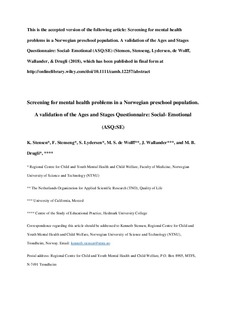| dc.contributor.author | Stensen, Kenneth | |
| dc.contributor.author | Stenseng, Frode | |
| dc.contributor.author | Lydersen, Stian | |
| dc.contributor.author | de Wolff, Marianne S. | |
| dc.contributor.author | Wallander, Jan Lance | |
| dc.contributor.author | Drugli, May Britt | |
| dc.date.accessioned | 2018-01-30T08:15:55Z | |
| dc.date.available | 2018-01-30T08:15:55Z | |
| dc.date.created | 2017-12-14T14:02:33Z | |
| dc.date.issued | 2018 | |
| dc.identifier.issn | 1475-357X | |
| dc.identifier.uri | http://hdl.handle.net/11250/2480527 | |
| dc.description.abstract | Background: Early detection of mental health problems in childhood is important. However, studies on screening instruments for preschool children are rare. The aim of the present study was to validate the Ages and Stages Questionnaire: Social-Emotional (ASQ:SE) with teacher reports and examine its screening accuracy in a preschool population. Methods: A total of 1428 children, aged 18 months – 5 years, attending childcare centers were recruited in Norway. Their teachers completed a survey including the ASQ:SE and the Caregiver-Teacher Report Form (C-TRF). The Spearman’ correlation was calculated for the convergence between the ASQ:SE and the C-TRF and the screening accuracy of the ASQ:SE was assessed using receiver operating characteristic (ROC) analysis with the criterion of a score at or above the 90th percentile for the C-TRF total problem score. Results: The Spearman’ correlations between the total scores for the ASQ:SE and the C-TRF were from .49 to .72. The ROC analyses demonstrated that the ASQ:SE had a promising ability to classify children at risk based on the C-TRF criterion with AUC ranging from .87 to .96 for the different forms. The ASQ:SE generally demonstrated high specificity across all forms and some forms (from age 30 months upwards) produced both high sensitivity and high specificity using the selected cutoff values. Conclusion: The ASQ:SE could serve as a good starting point for screening for social-emotional problems among children in childcare centers. The 30- to 60-month ASQ:SE forms exhibit promising psychometric properties and may prove useful for early detection. The 18- to 24-month ASQ:SE forms demonstrate more limited efficacy in detecting children at risk. | nb_NO |
| dc.language.iso | eng | nb_NO |
| dc.publisher | Wiley | nb_NO |
| dc.title | Screening for mental health problems in a Norwegian preschool population. A validation of the Ages and Stages Questionnaire: Social- Emotional (ASQ:SE) | nb_NO |
| dc.type | Journal article | nb_NO |
| dc.type | Peer reviewed | nb_NO |
| dc.description.version | acceptedVersion | nb_NO |
| dc.source.journal | Child and Adolescent Mental Health | nb_NO |
| dc.identifier.doi | 10.1111/camh.12257 | |
| dc.identifier.cristin | 1527460 | |
| dc.description.localcode | Thisis the accepted version of the following article: Screening for mental health problems in a Norwegian preschool population. A validation of the Ages and Stages Questionnaire: Social-Emotional (ASQ:SE) (Stensen, Stenseng, Lydersen, de Wolff, Wallander, & Drugli(2018), which has been published in final form at http://onlinelibrary.wiley.com/doi/10.1111/camh.12257/abstract. Locked until 25 January 2019 due to copyright restrictions. | nb_NO |
| cristin.unitcode | 194,65,35,5 | |
| cristin.unitcode | 194,65,35,0 | |
| cristin.unitname | RKBU Midt-Norge - Regionalt kunnskapssenter for barn og unge - psykisk helse og barnevern | |
| cristin.unitname | Institutt for psykisk helse | |
| cristin.ispublished | true | |
| cristin.fulltext | postprint | |
| cristin.qualitycode | 1 | |
